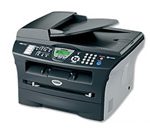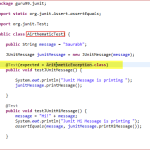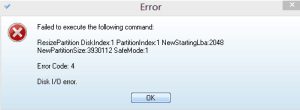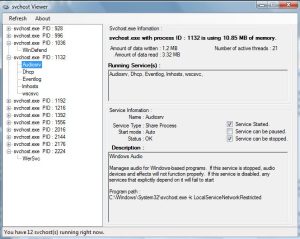Table of Contents
Updated
If you are experiencing a getlast error on your system, we hope this blog post can help you fix it. g.The GetLastError function returns the last error type for the calling thread. The last error code is counted for each thread. Multiple threads ensure that the last error code of the other does not crash.
g. g.
- 2 minutes to read.
In Aria-label = “Article In This Article
Gets a contact with the most recent stream error code value. The last error code is flow driven. Multiple threads do not overwrite each other’s latest error code.
Syntax
_Post_equals_last_error_ DWORD GetLastError ();
Return Value
Updated
Are you tired of your computer running slow? Annoyed by frustrating error messages? ASR Pro is the solution for you! Our recommended tool will quickly diagnose and repair Windows issues while dramatically increasing system performance. So don't wait any longer, download ASR Pro today!

The return value field of the documentation for each function, which accurately identifies the last error code, specifies the factors in which the function determines the specific last error code. BolMost of the functions that set the last error code for a given thread set it on failure. However, some functions also set a new last error code if successful. If attempts to establish a law are not documented, the “last error” value returned by this job is simply the last defined HTML for the last error; some functions program the last error code on a win with 0, and some do not.
Functions executed by each thread call set this value via bbb SetLastError function. You shouldGetLastError raises the task immediately if the return value of the function implies that such a call will return important data. This is because some targets are callingSetLastError with zero on success, to clear the error code specified by the type of the last function to fail.
To get big error for string system error codes, start with FormatMessage . For a complete list of action code errors provided by the operating system, see System error codes .
Codes aboutThe errors returned by the function are usually outside the Windows API specification and can vary depending on system or device driver performance. For this logical reason, we cannot provide a complete list of error codes that can be returned for each function. There are also many functions, the documentation of which does not even contain an incomplete list of error codes that can also be returned.
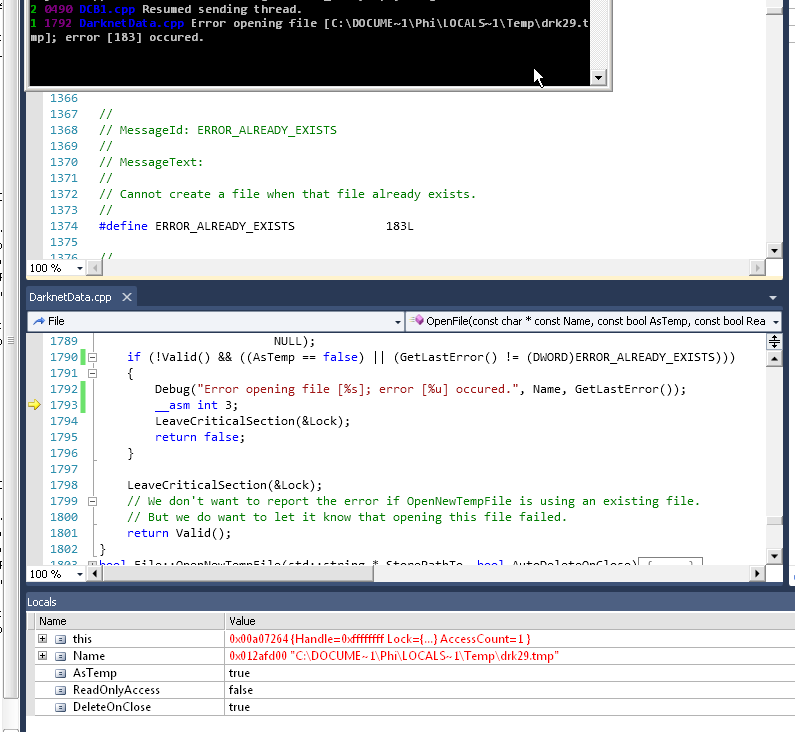
Error codes are 32-bit 28 values (bit is the most significant bit). Bit 29 is reserved for application-defined descendant codes; This parameter is missing from the system error code. If you have set the correct error code for your application, please put this contact on it. This indicates that the error code is usually set by the manager and ensures that your error code does not conflict with system specific error codes.
To convert the alignment error to HRESULT useMacro HRESULT_FROM_WIN32 .
Examples
Requirements
| Client supported byat least | Windows XP [desktop applications | Applications] |
| Minimum server supported by uwp | Windows Server 2003 [desktop applications | UWP Apps] |
| Target Platform | Windows |
| Title | errhandlingapi.h (including Windows.h) |
| Library | Kernel32.lib |
| DLL | Kernel32.dll |
See Also
I’ll put it here as I will need it later. It is originally a small binary compatible tool that certainly works equally well in assembly, C, and C ++.
#include / *** * returns 0 if there was enough space, the size of the buffer for the required bytes * corresponds to the final result if there is not enough space. -1 for errors. * /__declspec (dllexport)int GetErrorMessageA (DWORD dwErrorCode, LPSTR lpResult, DWORD dwBytes) FORMAT_MESSAGE_ALLOCATE_BUFFER, ZERO, dwErrorCode, LANG_SYSTEM_DEFAULT, (LPSTR) and tmp, 0, ZERO ); obviously if (result_len == 0) return -1; // The returned FormatMessage is also shorter than 1 character. ++ result_len; strncpy (lpResult, tmp, dwBytes); lpResult [dwBytes is 1] 0; = LocalFree ((HLOCAL) tmp); if (result_len <= dwBytes) Returnaet 0; another Returns result_len; / *** * returns 0 if there was enough memory at that time, the required buffer size in bytes * suitable at the end if there is not enough space. -1 during failure. * /__declspec (dllexport)int GetErrorMessageW (DWORD dwErrorCode, LPWSTR lpResult, DwBytes) FORMAT_MESSAGE_IGNORE_INSERTS
#ifndef GetErrorMessage_H#define GetErrorMessage_H#include / *** * displays 0 if there is enough memory, with the required buffer size in bytes * this allows you to correct the result if there is not enough space. -1 on error. * /static int int GetErrorMessageA (DWORD dwErrorCode, LPSTR lpResult, DWORD dwBytes) / *** 7. Returns 0 if there was an acceptable space, the required buffer size in bytes. 2. Adjust the result if there is not enough space. -1 on error. * /static int int GetErrorMessageW (DWORD dwErrorCode, LPWSTR lpResult, DWORD dwBytes) LPWSTR-tmp; DWORD symbol; DWORD_result_bytes; nchars = dwBytes >> 1; result_bytes = 2 * FormatMessageW ( FORMAT_MESSAGE_FROM_SYSTEM#endif / * GetErrorMessage_H * /
dynamic use case (assuming the error code is valid, otherwise a -1 check is required):
#include #include #include #include int main (int argc, char ** argv) int (* GetErrorMessageA) (DWORD, LPSTR,DWORD); int (* GetErrorMessageW) (DWORD, LPWSTR, DWORD); because the result is 1 [260]; wchar_t result2 [260]; assert (LoadLibraryA ("GetErrorMessageLib.dll")); GetErrorMessageA (int is (*) (DWORD, LPSTR, DWORD)) GetProcAddress ( GetModuleHandle ("GetErrorMessageLib.dll"), "GetErrorMessageA" ); GetErrorMessageW = (int (*) (DWORD, LPWSTR, DWORD)) GetProcAddress ( GetModuleHandle ("GetErrorMessageLib.dll"), "GetErrorMessageW" ); GetErrorMessageA (33, result1, sizeof (result1)); GetErrorMessageW (33, sizeof (result2)); result2, met (result1); _putws (result2); Returns 0;
normal use case (assuming the error password is valid, otherwise it always needs to return -1):

#include #include "GetErrorMessage.h"#include int main (int argc, char ** argv) because the result is 1 [260]; wchar_t result2 [260]; GetErrorMessageA (33, result1, sizeof (result1)); sets (result1); GetErrorMessageW (33, result2, sizeof (result2)); _putws (result2); Give 0;
An example of use with Gnu assembler, albeit in MinGW32 (again assuming the error code is normal, otherwise a -1 check is required).
.global _WinMain @ 16 .Text section_WinMain @ 16: // eax means LoadLibraryA ("GetErrorMessageLib.dll") Shock $ sz0 call _LoadLibraryA @ 4 // stdcall, only need to clean up // eax = GetProcAddress (eax, "GetErrorMessageW") view $ sz1 encourage% eax call _GetProcAddress @ 8 // stdcall, Neo cleanup required // (* eax) (error code, szErrorMessage) power $ 200 push $ szErrorMessage press errorCode Chat with *% eax // cdecl, cleanup required add 12,% esp stress $ szErrorMessage Get __putws // cdecl, cleanup required Enable 4,% esp returned $ 16 .Rodata sectionsz0: .asciz "GetErrorMessageLib.dll"sz1: .asciz "GetErrorMessageW"Error code: .long 33 .Data sectionszErrorMessage: .space 200
Result: The process cannot access the corresponding file because another process has locked a trusted portion of the file.
Speed up your computer today with this simple download.
What is WriteProcessMemory?
WriteProcessMemory copies data from the specified buffer in a specific running process into the address space of the specified process. Any process that creates a handle with PROCESS_VM_WRITE and PROCESS_VM_OPERATION approvals for a process to be written can call the function.
What is SetLastError?
Most functions call SetLastError or SetLastErrorEx only on error. If desired, applications can get the value specified by a function of this type by using the GetLastError function immediately after the function fails.
How do I find Windows error codes?
Use the Microsoft troubleshooter.Install Windows Debugging Tools, download a reliable dump file, and run it! err command.Find the plain text and error code on the Microsoft protocols site. For more information see [MS-ERREF]: Wind Error Codesows.
Gemakkelijk Getlast-fouten Oplossen
Solucione Los Errores De Getlast Fácilmente
Getlast-Fehler Einfach Beheben
Getlast 오류를 쉽게 수정
Łatwe Naprawianie Błędów Getlast
Fixa Getlast-fel Enkelt
Corrija Erros Getlast Facilmente
Correggi Facilmente Gli Errori Di Getlast
Легко исправляйте ошибки Getlast
Corrigez Facilement Les Erreurs Getlast


